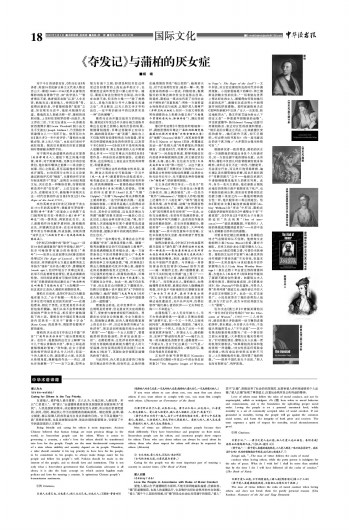爱人为大/àirén-wéidà/Caring for Others Is the Top Priority.
友爱他人、爱护他人最为重要。古人认为,天地之间,人最宝贵,所以“仁者爱人”。将“爱人”由道德情感层面推及到国家层面就体现为“爱民”。人民是国家的根本,决定着国家的安危与成败,所以统治者要把爱民、亲民、利民、顺应民心作为治国理政的最高原则。制定政策、法律,确立制度,都以保障人民的利益为出发点和最终目的。它不仅是儒家“仁政”思想的体现,也是法家制定法律、依法治国的重要理念,它彰显了中华民族崇高的人文情怀。
Beingfriendly and caring for others is most important. Ancient
Chinese believed that human beings are most precious things in
the world, so benevolent people care for others. When it comes to
governing a country, a ruler’s love for others should be transformed
into love for the people. People are the most fundamental
components of a state whose stability and security depend on its
people. Therefore,a ruler should consider it his top priority to have
love for his people,to be considerate to his people, to always make
things easier for his people and follow his people’s will. Policies
should be made in the interest of the people, and so should laws
and institutions.This is not only what a benevolent government
that Confucianism advocates is all about, it is also the basic
concept on which ancient legalists made policies and laws for
running a country. It epitomizes Chinese people’shumanitarian
sentiments.
引例 Citations:
◎欲人之爱己也,必先爱人;欲人之从己也,必先从人。(《国语·晋语四》)
(想要他人对自己友爱,一定先对他人友爱;想要他人遵从自己,一定先要遵从他人。)If you want others to care about you, you must first care about
others; if you want others to comply with you, you must first
comply with others. (Discourseson GovernanceoftheStates)
◎君子所以异于人者,以其存心也。君子以仁存心,以礼存心。仁者爱人,有礼者敬人。爱人者人恒爱之,敬人者人恒敬之。(《孟子·离娄下》)
(君子之所以不同于一般人,在于心中存有的想法不同。君子心中总是想着仁,想着礼。仁者爱别人,有礼节的人尊敬别人。爱别人的人,别人总也爱他;尊敬别人的人,别人总也尊敬他。)
Men of virtue are different from ordinary people because they
think differently. They have benevolence and propriety on their
mind.Benevolent people care for others, and courteous people
show respect for others. Those who care about others can always
be cared about by others; those who show respect for others will
always be respected by others. (Mencius)
◎ 古之为政,爱人为大。(《礼记·哀公问》)(古代的为政之道,以爱民最为重要。)
Caring for the people was the most important part of running
a country in ancient times. (TheBookofRites)
爱人以德
/àirényǐdé/
Love the People in Accordance with Rules of Moral Conduct
爱他人要以合乎道德规范为原则,不能无原则地偏私偏爱、迁就纵容。“德”即道德规范,也指人的道德品行,它是维护良好社会秩序的内在依据。“爱人”属于个人层面的情感,而“德”则是全社会应共同遵守的规范。“爱人”若不“以德”,则既违背了社会的共同规范,也损害爱人者和被爱者的个人品德。“爱人以德”体现了尊崇道义、注重社会秩序及公共利益的精神。
Love of others must follow the rules of moral conduct, and not
be unprincipled, selfish or indulgent. De (德) here refers to moral
behavior and consciousness, and is the foundation for upholding
proper social order. Loving the people is on a personal emotional
level,while morality is a set of commonly accepted rules of social
conduct. If not grounded in morality,loving the people will go
against the common social norms, and harm the integrity of both
giver and receiver. The term expresses a spirit of respect for
morality,social rderandcommon good.
引例 Citations:
◎曾子曰:“……君子之爱人也以德,细人之爱人也以姑息。吾何求哉?吾得正而毙焉斯已矣。”(《礼记·檀弓上》)
(曾子说:“……君子爱人要遵循道德规范,小人爱人则是一味迁就求得安宁。我还求什么呢?死的时候都能合乎规范,这已经心满意足了。”)
Zengzi said,“...Theman of virtue follows the codes of moral
conduct when loving others, while the petty person is indulgent
for the sake of peace. What do I wish for? I shall be more than
satisfied that by the time I die I will have followed all the codes
of conduct.”(TheBookofRites)
◎君子爱人以德,不可徇情废礼。(褚人获《隋唐演义》第二十三回)(君子爱人要遵循道德规范,不能曲从私情而坏了规矩。)
The man of virtue follows the rules of moral conduct when loving
others, and does not break them for purely personal reasons.
(Chu Renhuo: RomanceoftheSuiandTangDynasties)



 上一版
上一版


 缩小
缩小 全文复制
全文复制